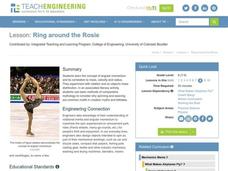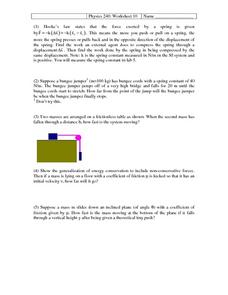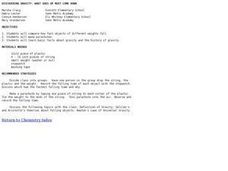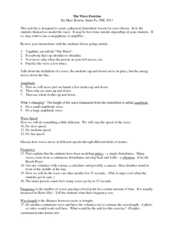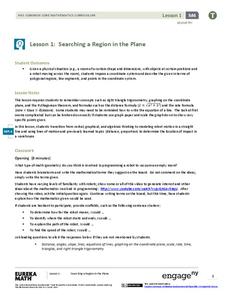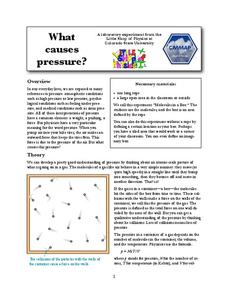Curated OER
Don't Crack Humpty
Students investigate the engineering design process and the relationship between distance, time, and speed. Using a generic car base, small groups design a device that will protect an egg on or in the car as it is rolled down a ramp at...
Curated OER
Elements of Physics: Motion, Force and Gravity
Students research about different human space explorations conducted by NASA. In this physical science lesson, students discuss why space exploration is important. They write a paper about their thoughts on continuing NASA's space...
Curated OER
Ring Around the Rosie
Students examine the concept of angular momentum and its correlation to mass, velocity, and radius. They listen to a teacher-led lecture, conduct an experiment with rotational inertia, angular momentum, and rotation speed by making...
Curated OER
Slinky Movement Lab
In this wave activity, learners use Slinky's to observe the properties of waves. They observe longitudinal waves, transverse waves, traveling waves and standing waves and record their observations. They calculate the frequency and...
Curated OER
Understanding Newton's Laws
In this physics worksheet, students investigate Newton's Three Laws. In this multiple choice, matching, and short answer worksheet, student answer eleven questions.
Curated OER
Forces
In this forces worksheet, students read about what affects the force on an object. Students identify push forces and pull forces in 5 diagrams. They answer 13 questions about the forces in two diagrams and they draw vector diagrams to...
Curated OER
Physics 240:10
In this physics 240:10 worksheet, students calculate the speed and distance as presented in the given word problems. Students apply their understanding of Hooke's law to answer the questions provided.
Curated OER
Discovering Gravity: What Goes Up Must Come Down
Students observe falling objects. In this lesson plan about gravity, students work in groups to determine how objects fall. Students determine speed of objects falling and whether weight is a factor. Students understand the concept of...
Curated OER
The Science of Hurricanes
Students explore hurricanes. In this science lesson, students discuss the aspects of hurricanes and watch videos of hurricanes. Students discuss the motion of the hurricanes.
Curated OER
Telecommunication
Each of these slides has notes for a teacher to support the activities that are planned for the students. The slides give details and facts about sound waves. Although this slide show delivers useful information about the sound waves,...
Curated OER
Physics Rewind
Eighth graders differentiate speed and velocity. In this physics lesson, 8th graders explain Newton's laws of motion. They calculate speed using a mathematical formula.
Curated OER
Weighted Averages
Weighted averages can be tricky to explain! However, this study guide makes it easy for teachers by including definitions, explanations, and breaking down problems into three steps. Includes mixture problems and uniform motion problems.
EZ Task
Forces
Investigate force, acceleration, Newtons, and vectors with this worksheet packet that starts with an overview fact sheet for reference. Learners label images as either push or pull forces, indicating if the force causes a change in...
NTTI
Vectors: Traveling, But in What Direction
High schoolers watch a video of real-world situations regarding speed, direction, velocity, force, etc. and answer questions while viewing. They then practice drawing and using vectors to solve more real-world problems.
The Science Spot
The Wave Exercise
During a lesson on wave motion, physical science participants basically act out the waves as a group. Through their movements, the amplitude, speed, frequency, and wavelength are all identified. Ideas for modeling the reflection and...
Physics Classroom
Action-Reaction Lab
Computer-interfaced motion detectors are required to carry out this inquiry. It is a new twist on exploring motion with plunger carts: they are set back-to-back and then propelled away from each other. Their velocities are measured, and...
Teach Engineering
Swinging Pendulum
Get into the swing of things. Pupils use a pendulum to demonstrate the conversion of potential energy to kinetic energy and back. After measuring the speed of a pendulum and compare it to the calculated theoretical speed, they...
Curated OER
A Moving Experience - Forces and Inertia
Students consider the first part of Newton's First Law of Motion, the Law of Inertia of objects at rest, which states that every object remains at rest unless acted on by a force. They perform hands-on experiments which demonstrate this...
Curated OER
As the Wheel Turns
This is not your typical Ferris wheel problem. In this exercise, your class will combine their knowledge of sinusoidal functions as well as linear motion to come up with parametric equations that model the position of a point on the edge...
New Mexico State University
Lab 6: Kepler's Laws
A 15-page package thoroughly teaches your physics or astronomy learners about Kepler's three laws of planetary motion. Each one is stated and explained. Class members answer questions, solve problems, and participate in the classic...
Curated OER
Plate Tectonics: First Grade Lesson Plans and Activities
A set of first grade geology lessons focuses on plate tectonics and movement of plate boundaries. During the pre-lab, learners experience three types of plate movement through a kinesthetic demonstration. The lab...
EngageNY
Searching a Region in the Plane
Programming a robot is a mathematical task! The activity asks learners to examine the process of programming a robot to vacuum a room. They use a coordinate plane to model the room, write equations to represent movement, determine the...
Curated OER
Unit VI: Worksheet 3 - Force, Velocity, Displacement
Those who take this challenge will draw force diagrams and then calculate velocities and displacement. The problems are applicable to any general physics curriculum that covers motion. Add this to your collection of homework...
Colorado State University
What Causes Pressure?
Are you feeling the pressure? Let loose a little with a kinesthetic activity that models molecular motion in a closed space! The activity varies conditions such as volume and temperature and examines the effects on molecules.
Other popular searches
- Speed and Motion
- Forces and Motion Speed
- Motion Speed and Velocity
- Force Motion Friction Speed
- Motion Speed and Distance
- Motion, Speed and Distance
- Speed Velocity Motion
- Describing Motion Speed
- Motion and Speed Labs
- Slow Speed Motion
- Speed and Motion Graphs
- Motion and Speed Lessons




